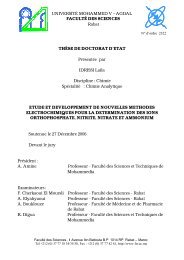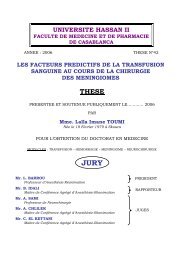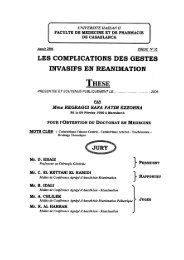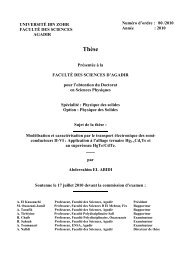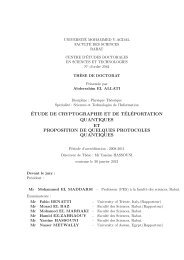- Page 1 and 2:
UNIVERSITÉ MOHAMMED V - AGDALFACUL
- Page 3 and 4:
TABLE DES MATIÈRES3.3 Invariants t
- Page 5 and 6:
TABLE DES MATIÈRES8.2 Fonctions de
- Page 7 and 8:
Avant ProposCe travail à été eff
- Page 9 and 10:
Lab/UFR PHEUne thèse représente u
- Page 11 and 12:
10Lab/UFR PHE
- Page 13 and 14:
Contributions à l’Etude du Verte
- Page 15 and 16:
Contributions à l’Etude du Verte
- Page 17 and 18:
Contributions à l’Etude du Verte
- Page 19 and 20:
Contributions à l’Etude du Verte
- Page 21 and 22:
Contributions à l’Etude du Verte
- Page 23 and 24:
Contributions à l’Etude du Verte
- Page 25 and 26:
2.1 Généralités sur les variét
- Page 27 and 28:
2.1 Généralités sur les variét
- Page 29 and 30:
2.1 Généralités sur les variét
- Page 31 and 32:
2.2 Conifoldavec (y 1 , y 2 ) ≠ (
- Page 33 and 34:
2.2 Conifoldoù µ est un nombre co
- Page 35 and 36:
2.3 Variétés de CY toriquesFig. 2
- Page 37 and 38:
2.3 Variétés de CY toriquesEn gé
- Page 39 and 40:
2.3 Variétés de CY toriquessur L
- Page 41 and 42:
2.3 Variétés de CY toriquesz3z1z2
- Page 43 and 44:
2.3 Variétés de CY toriquesFig. 2
- Page 45 and 46:
du vertex U 3r α = |z 1 | 2 − |z
- Page 47 and 48:
Contributions à l’Etude du Verte
- Page 49 and 50:
3.1 Théorie des cordes topologique
- Page 51 and 52:
3.1 Théorie des cordes topologique
- Page 53 and 54:
3.1 Théorie des cordes topologique
- Page 55 and 56:
3.1 Théorie des cordes topologique
- Page 57 and 58:
3.1 Théorie des cordes topologique
- Page 59 and 60:
3.1 Théorie des cordes topologique
- Page 61 and 62:
3.2 Dualité corde ouverte / corde
- Page 63 and 64:
3.3 Invariants topologiquesNotons a
- Page 65 and 66:
3.3 Invariants topologiquesoù F es
- Page 67 and 68:
3.3 Invariants topologiquesDans le
- Page 69 and 70:
3.3 Invariants topologiquesL’acti
- Page 71 and 72:
3.4 Modèle B et espace twistorielI
- Page 73 and 74:
H. Jehjouhprojectif complexe -PT d
- Page 75 and 76:
¢¡¤£¦¥¨§©£¦©¡©¤ !©"
- Page 77 and 78:
¢ Ï ¢ £ ‡Vß £¢+Ï¢ »~
- Page 79 and 80:
;_q¢¨œžŸ•£-d ŸšX¡£¢5¤
- Page 81 and 82:
"©‹%&$}¦|`kÏÕÿ [‘{¤Š+|Ç
- Page 83 and 84:
wÜÛ ¼¢~ x wÖÛ ¼Œ x ‘|16 |
- Page 85 and 86:
Ýqáq~ ‡'‡*…{‚©Ë Š4Œ
- Page 87 and 88:
œFF)©ÞFFœGFF+¢ÞFF‚ò ~ â
- Page 89 and 90:
ò ~ âbaâ`~âbá Iò ~ €ò ~ â
- Page 91 and 92:
†â Ïˇ45*H©|½ß(}e*…{¤
- Page 93 and 94:
Î/ ¥¨w ¢yx ¥H´³:Mb:óGϳ
- Page 95 and 96:
,n£¢R|1"…}¤|Z‹‡ ¦b¥G/¢
- Page 97 and 98:
GÏÕÛ Þ ³] Þ IA{ ‡'ß ì=Ï
- Page 99 and 100:
¢¢,ø ùù¢¢¢¨¢ùù¢¢ ³r
- Page 101 and 102:
" GG+-, Ú/. 0+-, Ú1. 0G¢$Þã«G
- Page 103 and 104:
¢GÓ6¢@?¢‡©>6'&½‹-, ‡'
- Page 105 and 106:
,¢¢ Œ ¢ H}MBÏ 7¢¦, Ú1. 0‡
- Page 107 and 108:
——ý5g>ÊSØsÏ+È8ÄÀ8ÎÅ
- Page 109 and 110:
4.1 Variétés de CY toriques et cr
- Page 111 and 112:
4.1 Variétés de CY toriques et cr
- Page 113 and 114:
4.1 Variétés de CY toriques et cr
- Page 115 and 116:
Cela a fait apparaître d’autres
- Page 117 and 118:
4.2 Fonction de partition perpendic
- Page 119 and 120:
4.3 Version raffinée de la fonctio
- Page 121 and 122:
4.3 Version raffinée de la fonctio
- Page 123 and 124:
4.4 Modèle du cristal fondu et con
- Page 125 and 126:
4.4 Modèle du cristal fondu et con
- Page 127 and 128:
4.5 Invariants topologiques dans le
- Page 129 and 130:
4.6 Contribution : Generalized MacM
- Page 131 and 132:
L.B. Drissi et al. / Nuclear Physic
- Page 133 and 134:
L.B. Drissi et al. / Nuclear Physic
- Page 135 and 136:
(Γ + (z) = exp −i ∑ )1n z−n
- Page 137 and 138:
L.B. Drissi et al. / Nuclear Physic
- Page 139 and 140:
L.B. Drissi et al. / Nuclear Physic
- Page 141 and 142:
L.B. Drissi et al. / Nuclear Physic
- Page 143 and 144:
L.B. Drissi et al. / Nuclear Physic
- Page 145 and 146:
(∏ ∞(Υ − (q) = Ω − qk ))k
- Page 147 and 148:
L.B. Drissi et al. / Nuclear Physic
- Page 149 and 150:
L.B. Drissi et al. / Nuclear Physic
- Page 151 and 152:
L.B. Drissi et al. / Nuclear Physic
- Page 153 and 154:
L.B. Drissi et al. / Nuclear Physic
- Page 155 and 156:
L.B. Drissi et al. / Nuclear Physic
- Page 157 and 158:
L.B. Drissi et al. / Nuclear Physic
- Page 159 and 160:
L.B. Drissi et al. / Nuclear Physic
- Page 161 and 162:
5.1 Formalisme du Vertex topologiqu
- Page 163 and 164:
5.1 Formalisme du Vertex topologiqu
- Page 165 and 166:
5.2 Formalisme du Vertex topologiqu
- Page 167 and 168:
5.2 Formalisme du Vertex topologiqu
- Page 169 and 170:
5.2 Formalisme du Vertex topologiqu
- Page 171 and 172:
5.2 Formalisme du Vertex topologiqu
- Page 173 and 174:
5.2 Formalisme du Vertex topologiqu
- Page 175 and 176: 5.3 Vertex Topologique et Théorie
- Page 177 and 178: H. JehjouhL’amplitude des produit
- Page 179 and 180: 176H. Jehjouh
- Page 181 and 182: 308 L.B. Drissi et al. / Nuclear Ph
- Page 183 and 184: 310 L.B. Drissi et al. / Nuclear Ph
- Page 185 and 186: 312 L.B. Drissi et al. / Nuclear Ph
- Page 187 and 188: 314 L.B. Drissi et al. / Nuclear Ph
- Page 189 and 190: 316 L.B. Drissi et al. / Nuclear Ph
- Page 191 and 192: 318 L.B. Drissi et al. / Nuclear Ph
- Page 193 and 194: 320 L.B. Drissi et al. / Nuclear Ph
- Page 195 and 196: 322 L.B. Drissi et al. / Nuclear Ph
- Page 197 and 198: 324 L.B. Drissi et al. / Nuclear Ph
- Page 199 and 200: 326 L.B. Drissi et al. / Nuclear Ph
- Page 201 and 202: 328 L.B. Drissi et al. / Nuclear Ph
- Page 203 and 204: 330 L.B. Drissi et al. / Nuclear Ph
- Page 205 and 206: 332 L.B. Drissi et al. / Nuclear Ph
- Page 207 and 208: 334 L.B. Drissi et al. / Nuclear Ph
- Page 209 and 210: 336 L.B. Drissi et al. / Nuclear Ph
- Page 211 and 212: 338 L.B. Drissi et al. / Nuclear Ph
- Page 213 and 214: 340 L.B. Drissi et al. / Nuclear Ph
- Page 215 and 216: Chapitre 6Vertex Topologique Raffin
- Page 217 and 218: 5.1 Raffinement du vertex topologiq
- Page 219 and 220: 5.2 Fonctions de partitions du vert
- Page 221: 5.2 Fonctions de partitions du vert
- Page 225: 5.4 Vertex raffiné et homologie de
- Page 229 and 230: 5.4 Vertex raffiné et homologie de
- Page 231 and 232: 226H. Jehjouh
- Page 233 and 234: 013509-2 Drissi, Jehjouh, and Saidi
- Page 235 and 236: 013509-4 Drissi, Jehjouh, and Saidi
- Page 237 and 238: 013509-6 Drissi, Jehjouh, and Saidi
- Page 239 and 240: 013509-8 Drissi, Jehjouh, and Saidi
- Page 241 and 242: 013509-10 Drissi, Jehjouh, and Said
- Page 243 and 244: 013509-12 Drissi, Jehjouh, and Said
- Page 245 and 246: Conclusion et perspectivesde ce doc
- Page 247 and 248: Fonctions de Schur et MacMahontopol
- Page 249 and 250: Chapitre 8Annexe : Fonctions de Sch
- Page 251 and 252: Fonctions de Schur et MacMahonFig.
- Page 253 and 254: Fonctions de Schur et MacMahondimen
- Page 255 and 256: Fonctions de Schur et MacMahonstric
- Page 257 and 258: Fonctions de Schur et MacMahonFig.
- Page 259 and 260: Fonctions de Schur et MacMahonFig.
- Page 261 and 262: Fonctions de Schur et MacMahonFig.
- Page 263 and 264: Fonctions de Schur et MacMahonPropo
- Page 265 and 266: Fonctions de Schur et MacMahonOn pe
- Page 267 and 268: Fonctions de Schur et MacMahona) Bo
- Page 269 and 270: Fonctions de Schur et MacMahonLe mo
- Page 271 and 272: Fonctions de Schur et MacMahonavec
- Page 273 and 274: Fonctions de Schur et MacMahonla ma
- Page 275 and 276: Fonctions de Schur et MacMahonayant
- Page 277 and 278:
Bibliographie[1] J. Polchinski, Str
- Page 279 and 280:
BIBLIOGRAPHIE[27] A.A. Belavin, A.
- Page 281 and 282:
BIBLIOGRAPHIE[57] A. Braverman and
- Page 283 and 284:
BIBLIOGRAPHIE[87] Yukiko Konishi, I
- Page 285 and 286:
BIBLIOGRAPHIE[119] D. A. Cox, The H
- Page 287 and 288:
BIBLIOGRAPHIE[150] C. Weiss and M.
- Page 289 and 290:
BIBLIOGRAPHIE[180] H. Awata and H.
- Page 291:
UNIVERSITÉ MOHAMMED V - AGDALFACUL



